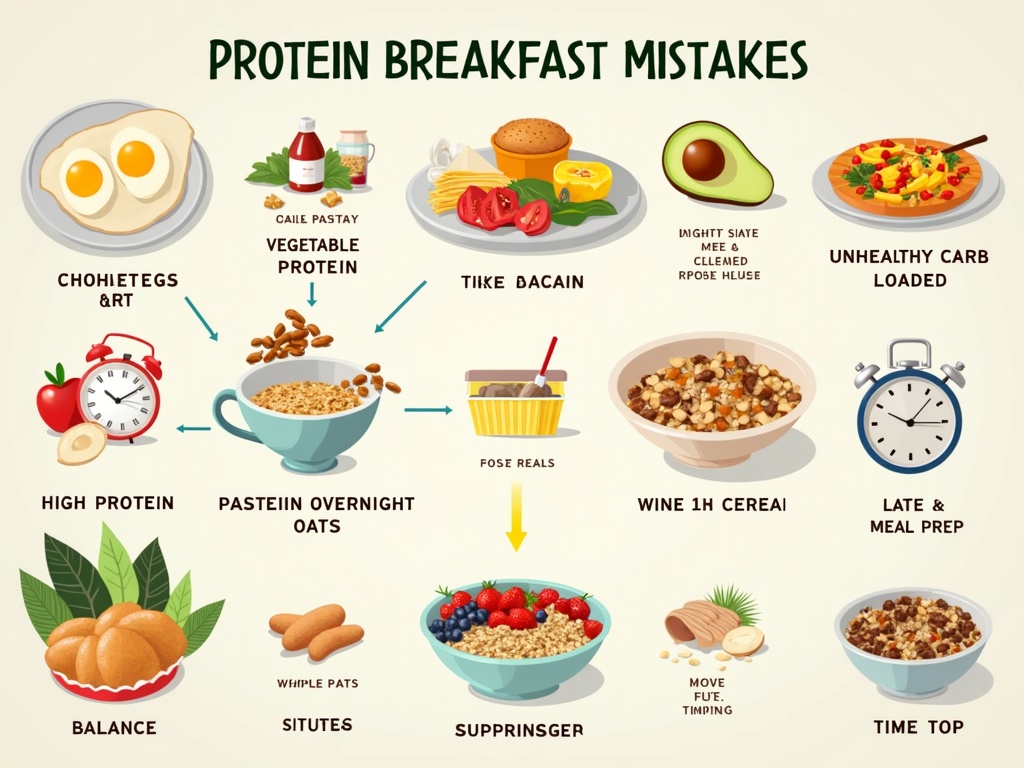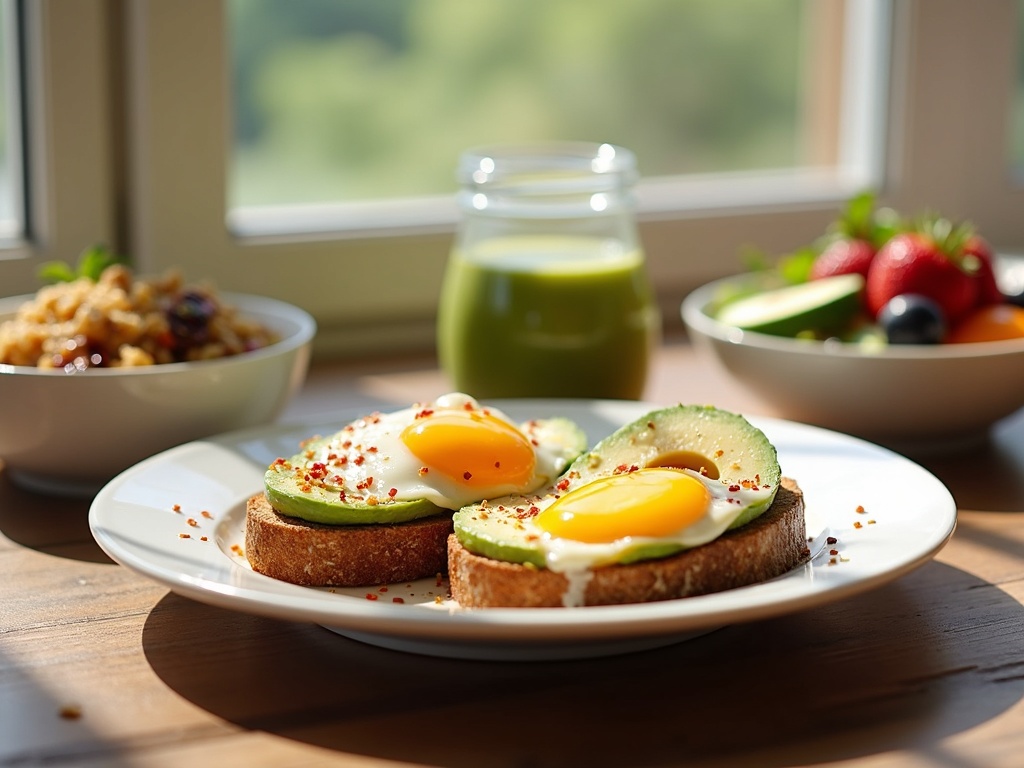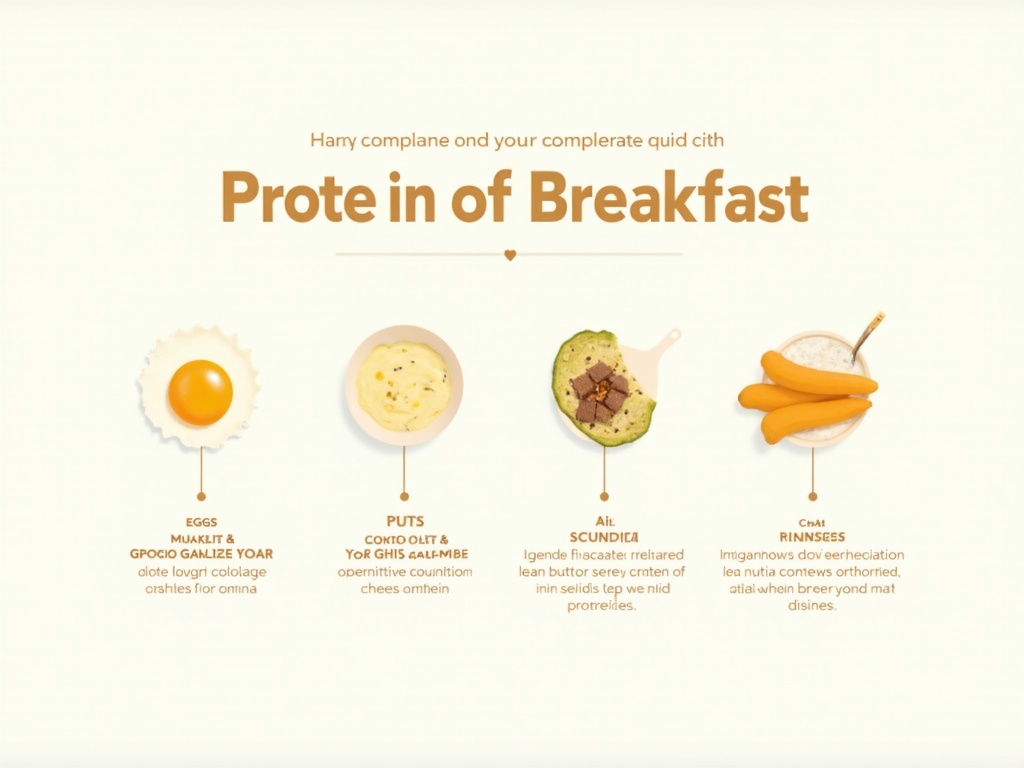A protein rich breakfast delivers significant benefits beyond hunger satisfaction, including better weight management, sharper cognitive function, and steadier blood sugar levels throughout the day. Studies indicate that eating 20-30 grams of protein in the morning can result in 7.5% more body fat loss over 12 weeks compared to low-protein alternatives, while also cutting cravings and maintaining muscle.
Find In This Article
Key Takeaways
- Consuming 20-30 grams of protein at breakfast helps reduce hunger cravings and keeps you fuller longer.
- High-protein breakfasts (35% of calories from protein) support weight management by boosting metabolism and preserving lean muscle.
- Morning protein intake improves cognitive function, focus, and productivity throughout the day.
- Protein rich breakfast options include eggs, Greek yogurt, cottage cheese, quinoa, and nut butters.
- Balancing protein with fiber and healthy fats creates the most satisfying and nutritionally complete breakfast.
Why Your Body Needs Protein Rich Breakfast
Starting your day with protein isn’t just a fitness trend—it’s backed by science. I’ve found that incorporating protein into my morning routine has transformed how I feel throughout the day. When I consume 20-30 grams of protein at breakfast, my hunger cravings significantly decrease and I stay fuller longer.
Weight Management and Body Composition Benefits
The impact of protein rich breakfasts on weight management is impressive. Research shows that a high-protein breakfast (where protein makes up about 35% of calories) can lead to 7.5% more body fat loss over just 12 weeks compared to low-protein options (12% of calories). This happens because protein:
- Boosts metabolism through its thermic effect (your body burns more calories digesting protein)
- Preserves lean muscle mass during weight loss
- Reduces the likelihood of overeating later in the day
- Helps stabilize blood sugar levels throughout the morning
I’ve noticed that when I eat protein-rich breakfasts for weight loss, I’m less tempted by mid-morning snacks and make better food choices all day.
Protein at breakfast also plays a crucial role in cognitive function. Studies have linked consuming about 25g of protein in the morning to better academic performance and mental clarity. My focus and productivity have noticeably improved since making this change.
For those looking to maintain or build muscle, morning protein is non-negotiable. High-protein breakfast foods like egg whites, Greek yogurt, or protein-packed overnight oats provide essential amino acids that support muscle protein synthesis after the overnight fasting period.
Beyond weight and muscles, a protein rich breakfast positively impacts fat metabolism and various health markers. I’ve found that options like egg muffin cups provide a convenient way to get my morning protein fix while improving my cholesterol profile and insulin sensitivity.
Don’t worry about complicated recipes—even simple solutions like high-protein breakfasts for weight management can be prepared quickly. Egg muffins can be made ahead for the entire week, giving you no excuse to skip this critical nutritional component of your morning.
Best Protein Rich Ingredients to Start Your Day
Getting enough protein in your breakfast sets you up for a productive day. I’ve found that incorporating the right protein-packed ingredients doesn’t just keep hunger at bay – it boosts metabolism and helps with muscle maintenance too. Let me share some standout morning options that pack a serious protein punch.
Top Protein Powerhouses for Breakfast
Eggs are my go-to breakfast staple, delivering 6g of protein per egg. They’re one of the few complete protein sources, meaning they contain all essential amino acids your body needs. I often prepare egg muffin cups for busy mornings – they’re portable and protein-packed.
Greek yogurt offers an impressive 10g of protein per 100g serving. It’s incredibly versatile – perfect plain, topped with fruit, or blended into smoothies. The tangy flavor and creamy texture make it a satisfying breakfast base.
Cottage cheese might not get the attention it deserves with 11g of protein per 100g. I love adding it to my high protein overnight oats for an extra boost that keeps me full until lunch.
Quinoa brings 8g of protein per cooked cup and works beautifully as a breakfast grain. Unlike many plant proteins, quinoa contains all nine essential amino acids, making it especially valuable for vegetarians and vegans.
Oats provide 6g of protein per cooked cup while delivering substantial fiber. They form the perfect base for high protein breakfast foods when combined with milk, yogurt, and nuts.
Nut butters like almond or peanut butter deliver approximately 8g of protein per 2 tablespoons. Just a spoonful adds significant staying power to toast, oatmeal, or smoothies.
Milk options, including dairy milk and certain plant alternatives like soy milk, provide around 8g of protein per cup. They’re perfect for cereal, smoothies, or protein breakfast for weight loss recipes.
Chia seeds might be small but offer 2g of protein per tablespoon, along with healthy omega-3 fatty acids and fiber. They create a satisfying pudding when soaked overnight or can be sprinkled on yogurt for added texture.
By combining several of these ingredients, you can easily create high protein breakfast for weight loss options that keep you energized throughout the morning. Something as simple as egg muffins paired with Greek yogurt can deliver over 20g of quality protein to start your day right.
Quick and Easy High-Protein Breakfast Ideas
Starting your day with a protein-rich breakfast doesn’t have to be complicated or time-consuming. I’ve rounded up some delicious options that pack a serious protein punch while being quick to prepare.
Power-Packed Morning Meals
A veggie omelet is my go-to choice when I need a protein boost. Using 2-3 eggs as a base provides approximately 18-21g of protein, and adding spinach and bell peppers increases both nutritional value and flavor. I like to fold in a sprinkle of cheese for extra protein and creaminess.
Greek yogurt parfaits are perfect for busy mornings. A 200g serving of Greek yogurt delivers around 20g of protein on its own. I layer mine with fresh berries, a tablespoon of chia seeds for omega-3 fatty acids, and a drizzle of honey for natural sweetness. This combination creates a balanced breakfast that keeps me full until lunch.
For a warming option, I love making protein-enhanced oatmeal. Regular oats contain about 5g of protein per serving, but stirring in a tablespoon of almond or peanut butter adds another 3-4g while creating a creamy texture.
When I’m really pressed for time, a protein smoothie is the answer. I blend plant milk with a frozen banana, a scoop of protein powder, and a spoonful of nut butter. This simple combination delivers around 20-25g of protein in a portable format.
Breakfast burritos offer amazing versatility and staying power. I scramble two eggs, add black beans, sprinkle cheese, and top with sliced avocado before wrapping everything in a whole wheat tortilla. The combination of eggs and beans creates a complete protein profile with approximately 20g per serving.
Overnight oats save precious morning time while delivering excellent nutrition. Before bed, I mix oats with Greek yogurt, chia seeds, and a splash of milk, then refrigerate. By morning, I have a ready-to-eat breakfast with around 15-20g of protein. For extra convenience, I sometimes prepare several jars at once for grab-and-go breakfasts throughout the week.
For a portable option perfect for meal prep, egg muffin cups are fantastic. I whisk eggs with chopped vegetables, pour into a muffin tin, and bake until set. Each muffin provides approximately 6g of protein, and they store beautifully in the refrigerator for quick reheating.
Common Protein Breakfast Mistakes to Avoid
I’ve helped hundreds of people revamp their morning meals, and the same protein pitfalls keep popping up. Making the most of your protein breakfast for weight loss means knowing what mistakes to sidestep.
Missing the Protein Mark
Skipping protein entirely is perhaps the biggest breakfast blunder. When you start your day without adequate protein, you’re setting yourself up for intense hunger pangs mid-morning. This often leads to snacking on whatever’s convenient – usually something processed and sugary.
Many people rely too heavily on carb-loaded breakfast options like plain toast, cereal, or pastries. These foods cause rapid blood sugar spikes followed by crashes that leave you hungry and fatigued soon after eating.
Not measuring your protein intake is another common error. For a truly satisfying and effective morning meal, aim for at least 20g of protein. This amount has been shown to promote fullness and support muscle maintenance. Creating high protein overnight oats can be an easy way to meet this target.
Overlooking Complementary Nutrients
A protein rich breakfast isn’t just about the protein – it’s about balance. Many people miss including:
- Fiber-rich foods that support digestion and fullness
- Healthy fats that slow digestion and enhance nutrient absorption
- Complex carbohydrates that provide sustained energy
Another mistake is not distinguishing between complete and incomplete protein sources. Complete proteins contain all nine essential amino acids your body needs but can’t produce. Animal products like eggs (perfect for egg muffin cups) naturally provide complete proteins, while most plant sources are incomplete.
If you follow a plant-based diet, combining different plant proteins like beans with grains creates complete protein profiles. Many newcomers to high protein breakfast foods don’t realize this important distinction.
The timing of your protein intake matters too. Spreading protein throughout the day is more effective than loading up at dinner. Starting with a high protein breakfast for weight loss sets a positive tone for balanced eating all day.
Lastly, don’t fall into the trap of making elaborate, time-consuming recipes that aren’t sustainable. Simple options like egg muffins that can be prepped ahead make protein rich breakfasts realistic for busy mornings.

Plant-Based Protein Options for Breakfast
Starting my day with plant-based protein has transformed my morning routine. I’ve discovered numerous ways to incorporate protein-rich plant foods into breakfast without sacrificing flavor or satisfaction.
Creative Plant Protein Breakfast Ideas
Quinoa breakfast bowls offer a versatile foundation for a protein-packed morning meal. I love cooking quinoa in cinnamon-infused plant milk, then topping it with fresh fruits, a drizzle of maple syrup, and a handful of crushed almonds. This simple bowl delivers around 8-10g of protein to kickstart my day.
Chia seed pudding has become my go-to make-ahead breakfast option. These tiny seeds pack a serious protein punch when soaked overnight in almond or soy milk. I typically mix 3 tablespoons of chia seeds with 1 cup of plant milk, add vanilla extract and a touch of sweetener, then refrigerate overnight for a creamy pudding with 10-12g of protein.
Smoothie bowls with added plant protein have revolutionized my breakfast game. Beyond just blending fruits, I add a scoop of plant-based protein powder with frozen bananas, berries, and a splash of plant milk for a thick, spoonable consistency. Topped with granola and fresh fruit, this breakfast delivers up to 20g of protein.
Black bean breakfast options might sound unconventional, but they’re delicious protein powerhouses. I’ve experimented with savory black bean breakfast bowls featuring seasoned beans, avocado, and salsa. For a quicker option, black bean flour can be mixed into pancake batter for a protein boost without the beany taste.
Nuts and seeds provide concentrated protein in small packages. I create my own protein rich mix with a combination of:
- Hemp seeds (10g protein per 3 tablespoons)
- Pumpkin seeds (8g protein per quarter cup)
- Chopped walnuts (4g protein per quarter cup)
- Ground flaxseed (2g protein per tablespoon)
This mix gets sprinkled over oatmeal, yogurt, or protein-rich overnight oats for an extra 5-10g of protein per serving.
Plant-based protein powders have become my secret weapon for boosting morning protein intake. Beyond smoothies, I incorporate them into overnight oats, pancake batter, and even homemade granola bars. Pea protein, brown rice protein, and hemp protein all work wonderfully in breakfast recipes designed for weight management.
These plant-powered breakfast options prove you don’t need animal products to start your day with adequate protein. I’ve found these meals particularly helpful when preparing high-protein breakfasts that support weight loss goals while keeping me satisfied until lunch.
Power-Packed Breakfast Combinations
Starting my day with a protein rich breakfast has transformed my energy levels and helped me stay full until lunch. I’ve discovered several delicious combinations that pack a serious protein punch while keeping my taste buds happy.
Eggs and Whole Grain Pairings
Eggs serve as the foundation for one of my favorite morning meals. I combine two scrambled eggs with a slice of whole grain toast and half an avocado for a breakfast that delivers around 20 grams of protein. The healthy fats from the avocado pair perfectly with the protein rich eggs, creating a meal that sustains me for hours. For extra flavor, I add a sprinkle of red pepper flakes or a dash of hot sauce. When I’m in a hurry, I make egg muffin cups by whisking eggs with vegetables and baking them in a muffin tin – they’re perfect for grab-and-go mornings.
Yogurt and Smoothie Protein Boosters
Greek yogurt has become my protein breakfast superstar, offering around 15-20 grams of protein per serving. I create a simple yet satisfying breakfast by mixing plain Greek yogurt with a handful of granola and fresh berries. For added protein, I sometimes stir in a tablespoon of nut butter or a sprinkle of hemp seeds.
On mornings when I need breakfast on the go, I blend up a high protein breakfast smoothie that combines:
- A scoop of protein powder (20-25g protein)
- A handful of spinach or kale
- Half a banana and some berries
- A tablespoon of nut butter
- Milk or plant-based milk alternative
Another great option is high protein overnight oats, which I prepare the night before. I mix rolled oats with milk, protein powder, chia seeds, and a touch of maple syrup, then top with nuts and fruit in the morning. This breakfast provides a balanced mix of protein, complex carbs, and healthy fats.
For savory breakfast lovers, I recommend building a breakfast bowl using quinoa as the base. I cook a batch of quinoa at the beginning of the week, then each morning I reheat a portion and top it with a fried egg, roasted vegetables, avocado, and a sprinkle of cheese. This combination delivers sustained energy and about 15-20 grams of protein.
By mixing and matching these high protein breakfast foods, I’ve found countless ways to start my day with the nutrition my body needs without getting bored of the same meal every morning.

Sources:
Daily Mail, The benefits of a high-protein breakfast
Journal of Nutrition, Protein and Weight Management
Nutritional Neuroscience, The Role of Protein in Cognitive Function
Springer Nature, Fasting and Meal Frequency: A Practical Approach to the Intermittent Diet

